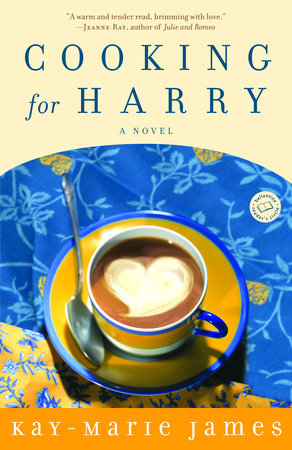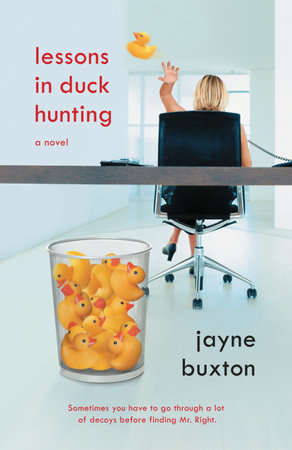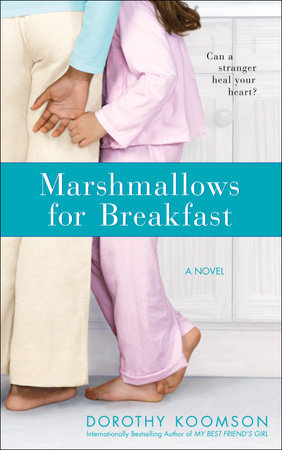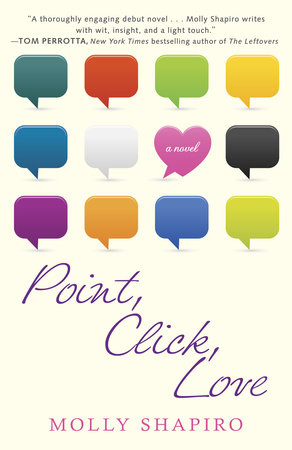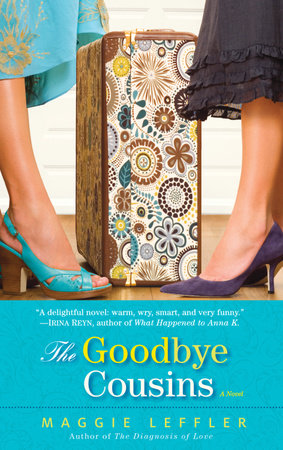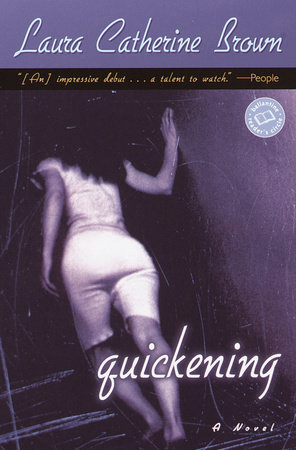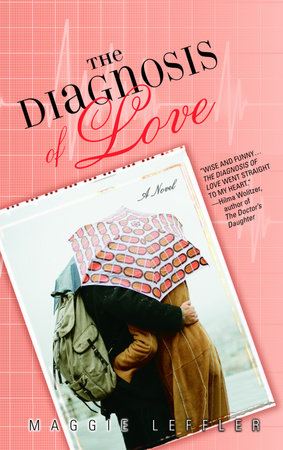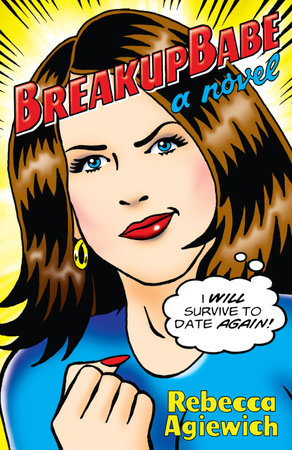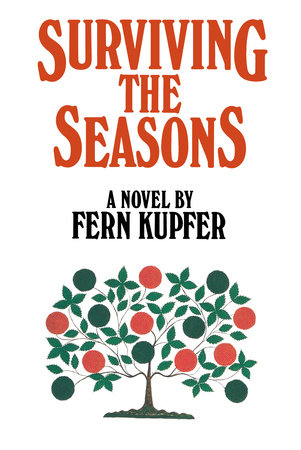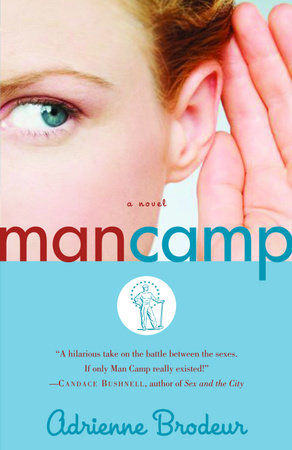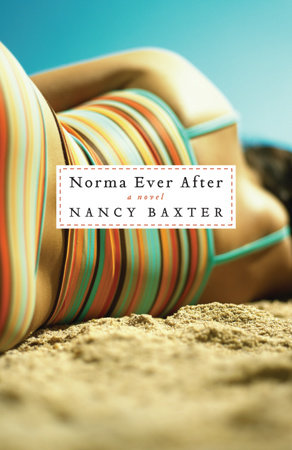Author Q&A
A CONVERSATION WITH KAY-MARIE JAMES
Q: A note in your biography says that you wrote Cooking for Harry for your best friend, who was struggling financially. Which came first, the specific idea for Cooking for Harry, or helping your friend? How did the two ideas merge?
A: The two ideas occurred pretty much simultaneously, though
it’s hard to re-create, exactly, how it all came about. Basically, I
had a book on the New York Times list, and my first big check
had just come in. My friend had recently given birth to her first
child—my first and only godchild—and she was trying to figure
out how she could afford to be a full-time mom. We were
having one of those late night, best friend phone conversations,
with lots of long pauses in which no one says anything and yet,
somehow, everything gets said. My friend didn’t want to simply
take money from me, and I wanted to do something for her and
the baby. Finally, we agreed that I’d write a book, something
easy and breezy and quick, using elements from her life, and in
return, she’d accept 50 percent of all royalties. We hatched the
plot together over the next few days, and I wrote the book in
three months.
Why the anonymity? A writer’s greatest challenge is finding
a balance between actually writing—the clean, quiet space
one needs to create art—and all the resulting promotional
obligations: interviews, book tours, questionnaires like this
one. Some people are good at maintaining this balance. I
am not. The thought of having to do yet another book tour
was simply overwhelming. And my friend, who really is a
physical therapist in Pittsburgh, was concerned that everybody
would think she, too, had run off with a handsome doctor.
(She has not. Nor have I, alas. In fact, I haven’t even been on a
cruise.)
Q: Cooking for Harry is a lot of fun to read. Did writing it pseudonymously allow you to have more fun with the writing process than you normally do? Was it easier to write under the cover of a fictional name? Did it make you want to write more books pseudonymously? Was there an ease or freedom in this process that might find its way in your other writing?
A: As I said, I wrote this book in three months. Typically, the socalled
literary novels I write take anywhere from two to four
years to complete. This is because they are considerably more
complex, both in terms of the language they use and the multilayered
stories they tell. Cooking for Harry is a straightforward
romp, narrated by a person who wouldn’t blush if someone
pointed out that the story of her husband’s diet, and its effects
on their marriage, isn’t exactly on par with the woes of Anna
Karenina. This, rather than anonymity, was what made the
book fun to write. Everything was plot, plot, plot, with lots of
little curlicues of humor woven in. At the same time, perhaps
because of my background as a literary writer, I came to care
deeply about Francie—who is, after all, patterned somewhat on
my friend—and I wanted to present her as a fully-rounded character,
a living, breathing person, instead of merely a frazzled
mother, a frustrated wife.
Q: However light-hearted, Cooking for Harry is an accurate
portrait of a family that has slowly veered off into dysfunction.
There’s an “elephant in the living room,” a problem that has
been gingerly stepped around and cannot be stated. That is,
until a talking appliance comes into the home. The scale is one
of my favorite characters in the book. How did you ever think
“her” up?
A: I’m married to a computer geek, whose definition of “light
reading” is an algorithm textbook. He’s particularly interested
in “AI”—if you’re a geek, you know better than to actually
articulate the words “artificial intelligence”—and though I
myself am not particularly interested in AI, Bots, Worms, and
other technological horrors, I apparently picked up enough over
the years to invent the New You Digital Scale.
Q: All families are, of course, at least a little dysfunctional. But
Harry and Francie’s family, which still seems very loving, does
seem to be approaching a crisis, along with Harry’s weight.
Amber’s intimate relationship keeps blowing up and her empathy
is faulty; Jason has become a real rescuer and caretaker; and
Francie herself is an enabler. How much of the kids’ traits do
you think can be related to their father’s unspoken problem?
And to their parents’ relationship dynamics?
A: As you mention earlier, there is an elephant in the Kligler living
room, and it’s inevitable that, after years spent walking on
tiptoe, members of the family will move through the world in a
way that is slightly off-balance. I think the kids’ traits are like
the traits of people in general; it’s hard to separate nature from
nurture, though, clearly each influences the other. Except in the
case of Amber. Amber, I think, would be Amber even if she’d
been raised in the desert by a convent of nuns.
Q: Francie, as the narrator, is very engaging and funny, but she’s
also part of the problem, and at times a little self-justifying, even
borderline unreliable. Was she difficult to write, or did she write
herself? Did you, as the author, like her every step of the way?
A: I didn’t find Francie difficult to write because I knew that her
love for Harry was sincere, a quality I can respect. And since I
was writing a romantic novel, I knew that her sincerity would
have to be rewarded, in order to create a satisfying closure. I
don’t think I like or dislike any of my characters. It’s more that
I feel I understand them better, at times, than I do at other times.
In a well-written book of any genre, the writer understands his
or her characters even when the characters don’t understand
themselves.
Q: Harry is a man who, when he starts to become self-aware,
turns away from his wife and toward another woman. How did
you feel about how Harry conducted his diet and himself?
A: Again, thinking about understanding—as opposed to judging—
a character, I guess I thought about how his relationship with his
weight, his body, his manhood, must have been arrested somewhere
in adolescence. It isn’t a grown man who responds to
Krys Palcek’s advances; it’s the boy who was never picked for
the team, the kid who stayed home on prom night to watch TV
with his parents, the guy who sat in the college cafeteria, laughing
and nodding as the other guys talked about their weekend,
all the while shoving doughnuts into his mouth. So it’s not surprising
that Harry finds himself tempted when, for the first time,
women start looking at him not for who he is, as a person, but
for what he looks like, as a man. It’s also not surprising that,
ultimately, he returns to Francie—and she to him—because,
underlying everything, the two of them are best friends, have
been best friends, for a long, long time. You can find sexual
attraction just about anywhere, but an enduring, sustaining
friendship—that is, a strong marriage—is precious, a gift.
Q: I laughed out loud at the way Harry’s family and friends all
feel free to add their own two cents about dieting—“Diets don’t
work,” they tell Harry, and “live large,” and “doctors don’t know
squat.” What is this impulse that people have to undercut our
efforts? How do we humans ever survive our friends’ advice?
A: Isn’t it the truth? And especially when it comes to comments
about emotionally-charged issues like eating habits and body
image. Everybody who loves us—parents, children, spouses,
friends—feels, at some level, that their love gives them a particular
claim upon our physical selves. Therefore, if we attempt
to alter that physical self in any way, say, by getting a haircut,
buying new clothes, or going on a diet, everyone who loves us
leaps forward with a comment that has more to do with their
relationship to us, their sense of entitlement to the bodies we
inhabit, than to any exterior reality. You lose ten pounds, put on
a terrific dress, and your mother says, “Are you okay? You’re
looking so gaunt. You’re working too hard.” You paint your
toenails, and your husband says, “That color reminds me of
kumquats. I don’t like kumquats. Are you trying to tell me
something?”
I mean, Yeesh.
Q: This book is filled with facts and expertise about dieting and
gourmet cooking. Which was more amusing and/or compelling
to research: dieting, or gourmet cooking? Which was more fun
to describe: diets, or food? Did you find out anything about dieting
that particularly surprised or enlightened you?
A: I hate to cook. My friend hates to cook. Fortunately, we married
men who love to cook, men who kindly but firmly removed
the whisks from our hands as soon as we were married. Men
who, loving to cook, have battled the bulge, so to speak, all
their lives, and with varying degrees of success and failure.
Five years ago, when my husband went on the Atkins Diet,
he lost forty pounds. When my friend told her husband—let’s
call him “Joe”—about my husband, what Joe heard was that
my husband had lost forty pounds eating bacon, and so Joe
promptly began to fry up a pound of bacon for breakfast every
morning. When I told my husband about Joe and his bacon, he
(my husband) began to fry up a daily pound of bacon of his
own. Of course, he began to gain weight again; Joe, who was
eating bagels with his bacon, was putting on weight by the
stone. My friend and I were putting on weight because who can
resist the smell of frying bacon? Eventually, however, we all got
sick of bacon, and everybody’s weight went back to normal—
for better or worse.
What is the point of this seemingly pointless tale? The point
is that there was very little research required for this book
because, between my husband and my friend’s husband, there is
always a man in our lives who is trying to lose weight. Flannery
O’Connor once said that anyone with a childhood has enough
material to write fiction. Kay-Marie James says that anyone
with a dieting husband has enough material to write just about
anything.
Q: Changing one’s diet really is changing one’s entire life. Did
you know when you started writing this book how each of the
characters would change? Did any of them surprise you in any
way?
A: My friend and I mapped out the general arc of the novel
together, so I knew, from the start, the general trajectory of
Harry and Francie’s fallout and reconciliation. I also knew that,
this being a romantic comedy, any relationships that cropped up
in the course of writing Cooking for Harry would have to be
resolved pleasantly, in order for the reader to be satisfied. This
is quite different from the writing I’ve done before, which has
been more “literary” in nature and, therefore, tends to reflect
more accurately the casual brutalities and unanswered questions
of real life. I guess my biggest surprise was how well Francie’s
neighbors came together as a neighborhood, and also, how
large a role Francie’s mother came to play during the worst day
of Francie’s life. Originally, I’d conceived the mother merely as
a voice on the phone. It was my friend’s suggestion to have her
arrive for Jason’s graduation, where everybody got to know her
better, much better—in some cases, in fact, a little too well!
Q: It seemed very chancy for Harry and Francine’s marriage for
Francie to take a cruise with Tommy Choi. Did you know the
fate of her marriage when you sent her on that cruise? Do you
think that calm seas might have yielded a different ending for
Harry and Francie?
A: As far as Francie is concerned, her marriage is already over
by the time she boards the Czarina with Tommy Choi. But I
knew I’d have to find a way to foil any significant romantic attempts
between them, and since I myself get queasy floating on
a raft in a swimming pool, the solution wasn’t difficult to find.
Q: Cooking for Harry is just the book to give to people on a
diet: It’s amusing, it’s chockful of facts, it lightly but intelligently
maps the emotional territory of dieting. Have you invented a
new form—the self-help novel?
A: I love it! Academics claim Henry James as the father of the
modern novel; I find a satisfying synchronicity in naming Kay-
Marie James the mother of the self-help novel. And if you like
reading well-written stories about the relationship between life
and food, Ruth Reichl’s memoirs are wonderful. Also the opening
chapter of Carol Shield’s terrific novel, The Stone Diaries, will
make your mouth water even as it breaks your heart.
Q: Will Kay-Marie James be writing any other novels? Do you
have any other alter egos clambering for pseudonymous page
space? Do you recommend the pseudonymous experience to
other writers?
A: I have actually begun a second Kay-Marie James novel, though
it is on the back burner right now, as I focus on finishing something
of my own. I have many alter egos as, I suspect, most writers
do, but the issue, of course, is time. I’m married, I’m a
mother of a young child, I live close to my extended family, I try
to maintain some semblance of an intellectual relationship with
the publishing world through reviewing and promoting the works
of upcoming writers. Every day, there’s another small fire to put
out: somebody is sick, the car needs an oil change, I have to feed
my mom’s cats while she’s out of town. These things all take a
toll on alter egos, on egos in general. Maybe when I’m in my
eighties, I’ll have time for that Stephen King–style horror novel
I’ve always wanted to write.
Okay, maybe not.
